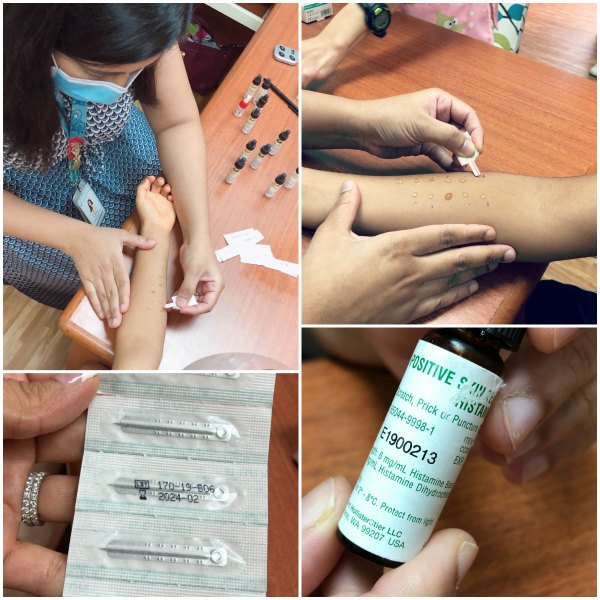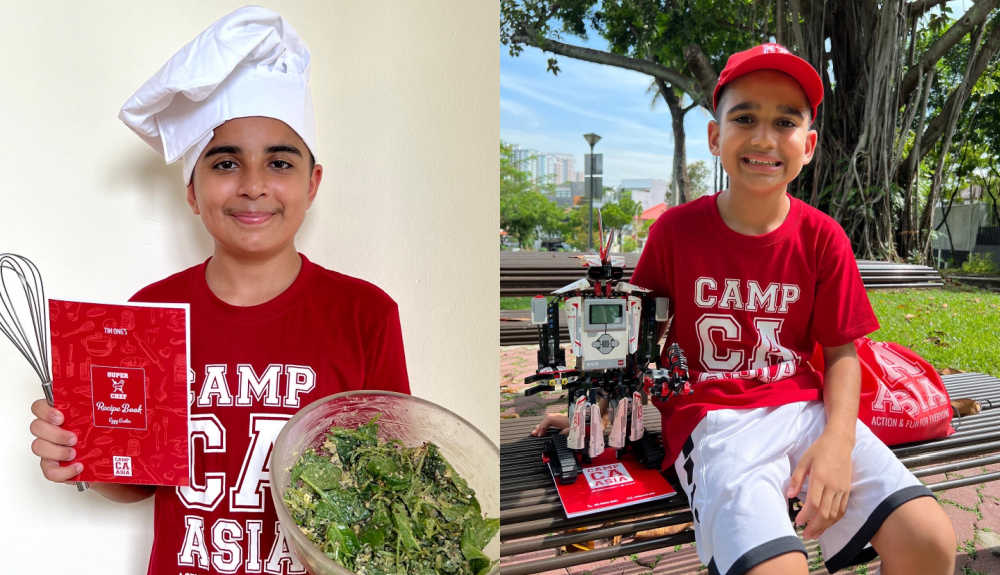
How do you know if your child has allergies? Hives, itchy/runny nose, sneezing, cough, eczema and red patches are all common signs of allergies in children. But what is your child actually allergic to? What allergy tests are suitable for babies and children, and what treatments are available?
Along with many other parents out there, these were some questions I had regarding childhood allergies and was curious to find answers for my own boys for their well-being. In an effort to find these answers, we began our journey with paediatric allergy specialist Dr Mohana Rajakulendran from Parkway East Paediatric Clinic in Singapore.
Here is an overview of the ins and outs of allergy testing in children and what you as a parent need to know…
Visit a Paediatric Allergy Doctor
If you think that your child might have allergies or if you just want peace of mind, the first thing you want to do is find a knowledgeable doctor that is experienced in paediatric allergies and treatment of children.
After a lot of research and recommendations from other parents, we decided to take the boys to see Dr Mohana at the Parkway East Paediatric Clinic at Parkway East Hospital.

In addition to treating common paediatric conditions, development screenings and childhood vaccinations, Dr Mohana is well known for her treatment of paediatric allergic conditions and respiratory allergies, including hives, eczema, chronic cough, allergic rhinitis and asthma. She is well versed in managing food and drug allergies, and also offers dust mite immunotherapy as a treatment option for allergic rhinitis. Most importantly, Dr Mohana was very warm, caring and patient when it came to answering all of our questions.
Determine the Best Allergy Test for Your Child
The first step in our journey was to consult with Dr Mohana to find out what test was best suited for the boys, based on their current symptoms and when these usually occurred.
There are many different types of tests available for allergies, including prick testing, blood testing and a variety of food and drug challenges. The first line of allergy tests in babies and children is usually the skin prick test and can be done at any age, but may be more accurate from the age of 6 months due to low levels of allergy antibodies in the earlier months.
As Zayden had symptoms of rhinitis and Xavion had a sporadic dry cough, we decided to do the “aeroallergen” panel skin prick test. This aeroallergen panel tests for the most common allergens in Singapore, which are the house dust mite, cockroach, mould, grass, tree, cat and dog dander. Some of the other skin prick tests available include grass, hamster, rabbit, grains, nuts, fish, shellfish, dairy and a variety of foods.
Overview of the Allergy Skin Prick Test
Once we had decided on what we were testing for, it was time to get started with the skin prick test.
Dr Mohana eased my nervous boys’ fears about the pricks and assured them it was safe and painless. The prick test involves putting a small amount of the extract containing the suspect allergen onto normal skin and scratching the surface using a small needle.

Then 15 minutes later we were able to see our results based on the swelling (or wheal) reaction of the small dots.

Zayden tested positive to being allergic to all three house dust mite species, whereas all of Xavion’s tests came out negative.
What Are the Next Steps to Take When Your Child Is Diagnosed with an Allergy?
Naturally as a parent, after hearing Zayden’s allergy diagnosis, we were extremely concerned and had many questions on what our next steps would be.
Dr Mohana explained that it is estimated that 40% of Singaporean children have allergic rhinitis and living in a tropical country like Singapore with high humidity makes dust mite allergies prevalent. Dust mites are microscopic creatures that are found everywhere in our environment – in mattresses, pillows, bed sheets, soft toys, sofas and carpets. She further explained that a lot of children that have allergic rhinitis, asthma or eczema are also likely to have dust mite allergies.
Early detection of respiratory or skin allergies is very important. This can help aid appropriate control of symptoms which could otherwise affect quality of life, sleep and even concentration in children. For food allergies, early detection allows for appropriate avoidance measures as each subsequent exposure to allergenic food can result in more severe or life-threatening actions.

Neither of my boys have ever been diagnosed, nor tested for these allergens in the past. Zayden did however have a pattern of waking up in the morning with a runny nose, which we just assumed was a result of the air conditioning. Now based on his test results, we realised that allergy testing was something that should have done a lot sooner so that many of his current symptoms could have been controlled.
Helpful Tips on Prevention & Control of Allergies in Children
Some helpful tips were provided by Dr Mohana regarding the prevention and control for all types of allergies in children, which I thought was important to share with my SuperMommy readers.
Once your child is diagnosed with an allergy, as a parent you should:
(1) Learn more about your child’s allergic triggers and how to avoid them.
(2) Formulate an action plan together with your child’s healthcare provider so that you are equipped with the knowledge of managing flares at home.
(3) Learn how to recognise symptoms for which you will need to bring your child in for immediate medical attention, such as an anaphylaxis episode, an acute exacerbation, asthma or a severe eczema flare.
(4) Speak with your child’s school teachers to share your child’s needs and emergency plans with them. If needed, arrange for a school visit to educate your child’s teachers and staff in school on the necessary allergen avoidance and appropriate use of emergency medication.
Get Your Kids Tested for Peace of Mind
After our diagnosis and a lengthy session with Dr Mohana on prevention and control, we now know that we need to reduce allergens in our household environment. Some of the basic steps would be to wash all of Zayden’s bed sheets in 60°C water, remove all stuffed toys from his room and use a special spray for dust mites on all fabric/cloth surfaces (including the carpets, curtains, mattress, soft toys, etc.). We should also watch for potential flare-ups that might occur in school, where dust mites would be present in the carpets, sofas and cushions that had not been sprayed.
If you suspect your child of having allergies, do not hesitate to get them tested by a trusted pediatric allergy specialist, like Dr Mohana Rajakulendran at Parkway East Paediatric Clinic. This will help both you and child on the right path to prevention and control of the symptoms like we did for our boys. Most importantly, it will give you peace of mind knowing you have a knowledgeable and caring doctor guiding you every step of the way. Trust me you will be happy you took the step!
-xoxo-
SuperMommy
Clinic Appointments, Hours & Contact Info
Parkway East Paediatric Clinic, #03-07 Parkway East Medical Centre, 319 Joo Chiat Place, Singapore 427989, Tel: 6229 5849
If your child requires a routine health assessment (for growth and development) or vaccinations, bring them to Parkway East Paediatric Clinic at the following hours: Monday to Saturday 8:30am – 10.30am. For children with other conditions, visit the clinic at the following timings: Monday to Friday, 10.30am – 1pm, 2pm – 4.30pm and Saturday 10.30am – 1pm. Theya are closed on Sundays and public holidays
The Seletar Mall Clinic – Shenton Medical Group, 33 Sengkang West Avenue, The Seletar Mall, #01-55/56, Singapore 797653
Paediatric specialist services available Tuesday and Thursday from 2:00 – 4:30pm *For appointments only, contact 6214 0363 or on their appointments page appointment.


















Hello I wanted to see doctor for my 3.2 years old girl
Once I was in school when my friend Sabrina ate pine nuts in lunch my eye swelled up and I was not allergic to nuts